Which Of The Following Statements Is True Regarding Climate Change And Isle Royale?
Article
Predator-Prey Relationships on Island Royale
On This Page Navigation
Why is Isle Royale a Unique Research Location?
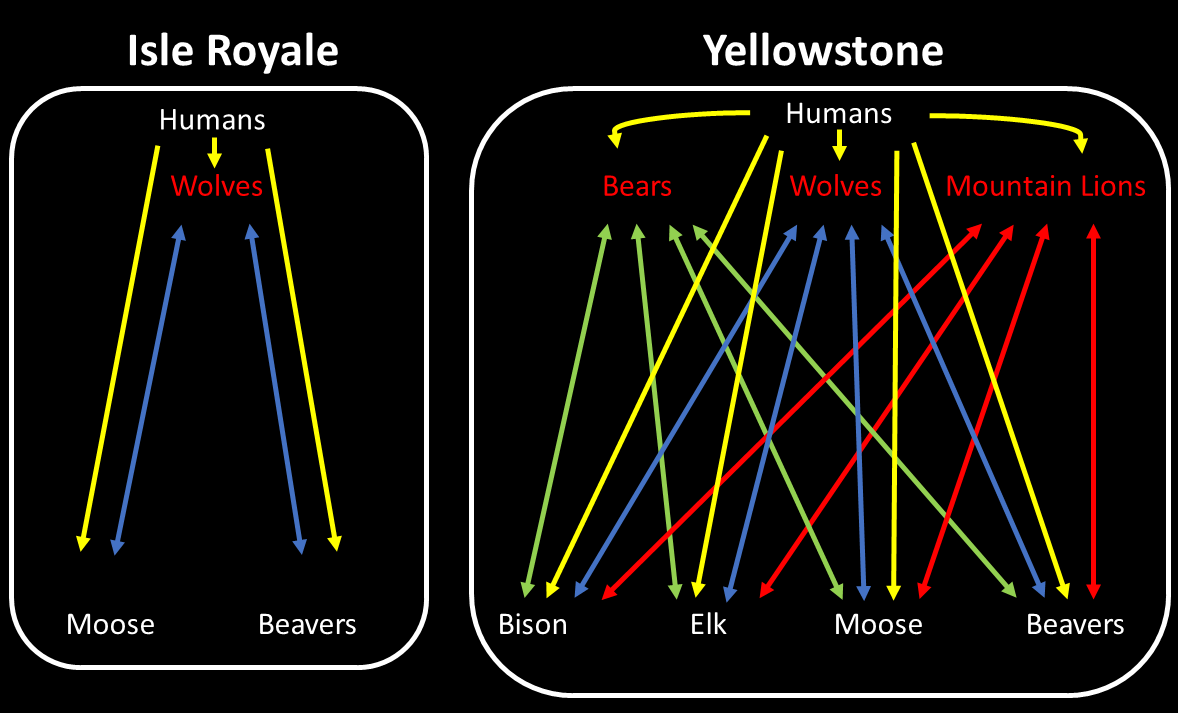
NPS
Isolation: Island Royale is an isle in Lake Superior. The closest mainland location is Canada, located well-nigh 20 kilometers to the due north.
Limited Human Influence: Isle Royale National Park was established in 1940. The park closes annually for public apply from October 30th to April 15th in guild to protect wildlife.
Simple Ecosystem: the island's remoteness restricts the number of species that populate the island.
Field researchers take conducted surveys of wolves, moose, beaver, and vegetation since the mid—1900s. Isle Royale predator-prey relationships have been continuously investigated since 1958- making this study the longest of its kind in the globe.
Isolation and Predator-Casualty Relationships
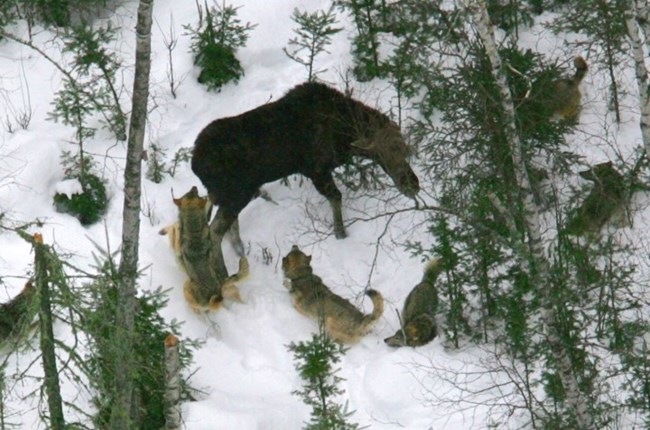
Photo Courtesy of J. Vucetich, Michigan Technological University
What if an ecosystem was unreachable for some species?
Non all mainland species are found on remote Isle Royale. Large mammals similar wolves, moose, and beaver accept made the journey. The trip can be too far for others. Animals that hibernate in the winter do not inhabit the isle—like bears. Hibernating animals miss the chance to cross an ice span that sometimes forms between the mainland and the island. Island Royale's isolation limits the number of species a part of its ecosystem.
What would happen if only one predator inhabited an isolated ecosystem?
Wolves accept been the single island apex predator of moose and beaver since the late 1940s. Other large predators are absent from the island, such as bears, coyotes, and mount lions. Wolves straight impact how many moose and beaver there are at Island Royale National Park.
What if an island lacked an noon predator? What if casualty roamed unchecked on a secluded landscape?
Scientists have been asking similar questions about the predator-prey relationships on Isle Royale for over threescore years. The populations of wolves, moose, and beavers have fluctuated over fourth dimension. One thing is sure- their island beingness is interconnected.
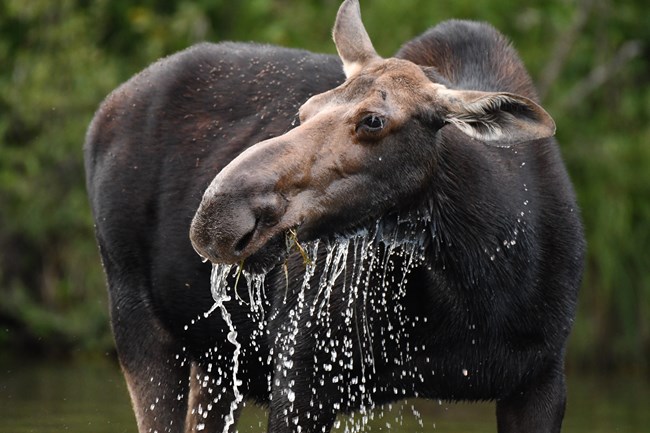
Photo Courtesy of Jonathan Ringdahl
Wolves and Moose
Island Predator: Wolves
Lynx and coyotes take been absent-minded from Isle Royale since the early to mid-1900s. Island presence of bears and mountain lions has not been recorded. Wolves became the single isle noon predator upon their late 1940s arrival.
Isle Prey: Moose
Moose were found on island in the early 1900s. Caribou and moose existed together for a brief period before caribou were wiped out in the early 1900s. Moose became a nutrient source for wolves upon wolf inflow to the isle.
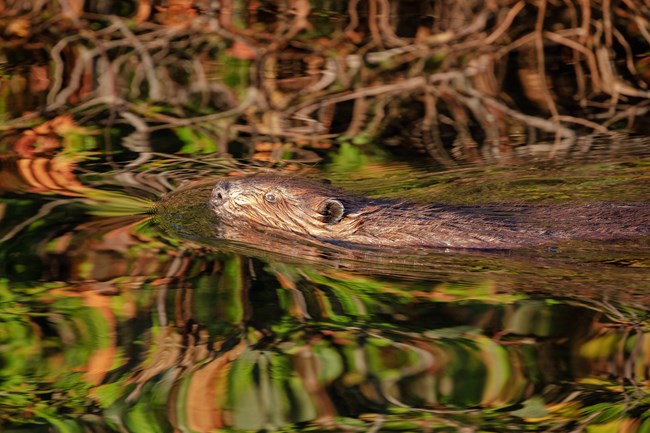
NPS / Jacob Frank
Wolves and Beaver
Island Predator: Wolves
Wolves utilise beaver as a secondary food source. Primarily in the summer wolves prey on beaver. In wintertime wolves volition lie in wait near beaver lodges in hopes of an ambush. Often beaver are hidden in their lodges under the rubber of ice.
Island Prey: Beaver
It is uncertain when beaver offset inhabited Island Royale. They are ecosystem engineers who construct dams that provide important aquatic habitats for other animals. Similar to moose, beaver are herbivores and influence island vegetation.
Predator-Prey Relationships: Wolves-Moose & Beaver
Although considered a relatively simple ecosystem when compared to the mainland, the relationships betwixt moose, beaver, and wolves on Isle Royale are quite complicated. Many internal and external factors influence the populations of isle predator and prey.
Internal Factors
-
disease
-
abundance of vegetation
-
prey
-
predators
External Factors
- climate change
- conditions
- disease
Abundance of prey on Isle Royale is undoubtedly influenced by the number of wolves, nevertheless, many other factors impact both moose and beaver populations. In one report, wolves were demonstrated to take a larger impact on the moose population prior to a disease outbreak within the wolf population than afterwards. In combination with decreasing populations of both moose and beaver, a likely increased amount of wolf on wolf bloodshed related to nutrient shortages, and the canine parvovirus (CPV2) disease outbreak which greatly reduced the number of pups surviving into adulthood, the Island Royale population of wolves, naïve to this strain of the virus, was significantly impacted. Dropping from 50 to 12 in only two years, this alter shifted the ecosystem from one where wolves had a greater influence on the prey population, to one where climate, available forage, and other undetermined factors were more influential. The relationships between prey and predator are constantly changing and that dynamic can be influenced by whatever number of environmental factors.
The island ecosystem may seem simple at starting time glance, merely relationships between island predator and prey are more complex than is readily credible.
Predator-Prey Inquiry
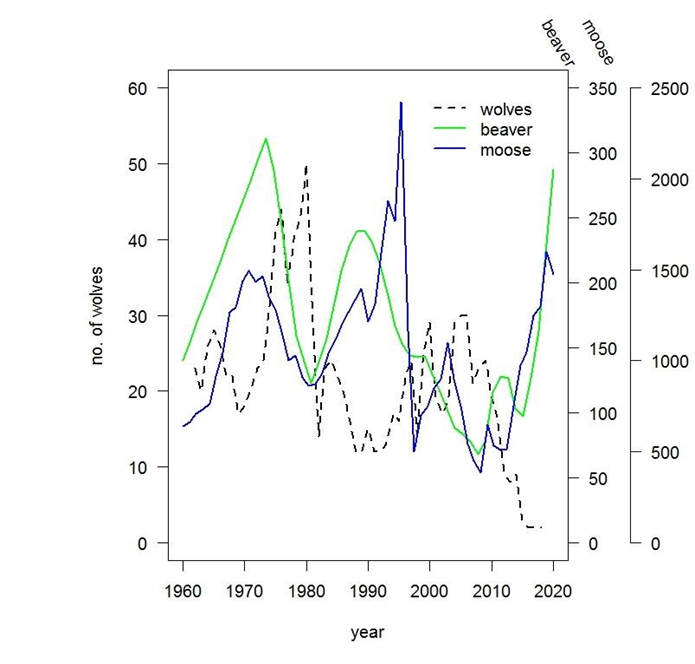
NPS/SUNY-ESF/MTU
This graph displays how Isle Royale predator and prey populations have varied through time. The National Park Service and Michigan Technological University take collaborated to acquit the longest consecutive predator-prey study that focuses on the relationship betwixt wolves, moose, beaver, and vegetation. Relationships among wolves, their prey, and the environment take been afflicted past:
-
fluctuating population numbers
-
moose and beaver effects on plant browse
-
wolf inbreeding depression
-
disease
-
vegetation dynamics
-
climatic change
Due to the wolf population decline in recent years, Isle Royale National Park decided to relocate wolves to the park in hopes to restore an apex predator in island predator-casualty relationships.
Final updated: Jan 6, 2022
Source: https://www.nps.gov/isro/learn/predator-prey-relationships-on-isle-royale.htm
Posted by: donaghyhtful1945.blogspot.com


0 Response to "Which Of The Following Statements Is True Regarding Climate Change And Isle Royale?"
Post a Comment